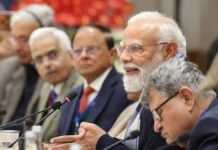Regarding the Citizenship Amendment Act i.e. CAA, different reactions are coming not only from the states of India but also from the countries around the world. Now an American MP has expressed concern over the implementation of CAA by the Indian government. He believes that as the US-India relationship deepens, it is important that cooperation be based on shared values of protecting the human rights of all, regardless of religion.
Citizenship Amendment Act: What happened when?
The Citizenship Amendment Bill was passed by the Parliament on December 11, 2019. This bill got the assent of the President just a day later. Through CAA, it will be easier for minorities belonging to Hindu, Sikh, Jain, Buddhist, Parsi and Christian communities from Pakistan, Bangladesh and Afghanistan to get Indian citizenship. Such minorities have entered India on or before December 31, 2014. Also the government had issued a statement that Indian Muslims need not worry as the CAA will not affect their citizenship and has nothing to do with the community.
Chairman of Foreign Affairs Committee expressed concern
Ben Cardin, chairman of the House Foreign Affairs Committee, expressed concern. Said, ‘I am deeply troubled by the Indian Government’s decision to implement the controversial Citizenship Amendment Act. I am particularly concerned about the potential impact of the law on the Muslim community living in India. Aggravating the matter is the fact that it is being implemented in the holy month of Ramzan.
He further said, ‘With the deep ties between the United States and India, it is very important that our cooperation be based on shared values of protecting the human rights of all people, regardless of religion.’
These people supported
Last week, the US State Department had expressed concern over the CAA notification and said that respect for religious freedom and equal treatment under the law for all communities are fundamental democratic principles. At the same time, India had sharply reprimanded the US State Department for criticizing the CAA and said that this is wrong information. However, the Hindu Policy Research and Advocacy Collective (HinduPact) and the Global Hindu Heritage Foundation have supported the CAA in separate statements.
He says that this law will help the persecuted Hindu, Christian, Sikh, Buddhist, Jain and Parsi minorities from India’s neighboring countries to get immediate citizenship. He said it underlines India’s dedication to protecting individuals and families against religious persecution.
CAA does not affect any citizen of India
Ajay Shah, founder and co-convenor of Hindupact, said, ‘CAA does not affect any citizen of India. Hindu minorities are discriminated against and harassed in India’s neighbourhood. As Americans, we are disappointed that instead of standing up for American values and the human rights of oppressed people, our government has chosen to oppose this humanitarian effort.’
Instead of criticizing Pakistan…
HinduPact co-convenor Deepti Mahajan said it was shocking to see the lack of sympathy for the plight of little girls from Hindu, Sikh and Christian minority communities in Pakistan. He further said, ‘According to the United Nations Human Rights Commission, every year in Pakistan, on an average, one thousand girls under the age of 10 are abducted, converted and become victims of forced marriage. Instead of condemning the Government of Pakistan for its involvement in this heart-breaking crime, the Ministry of External Affairs is criticizing the efforts of the Government of India to help these innocent victims.
















